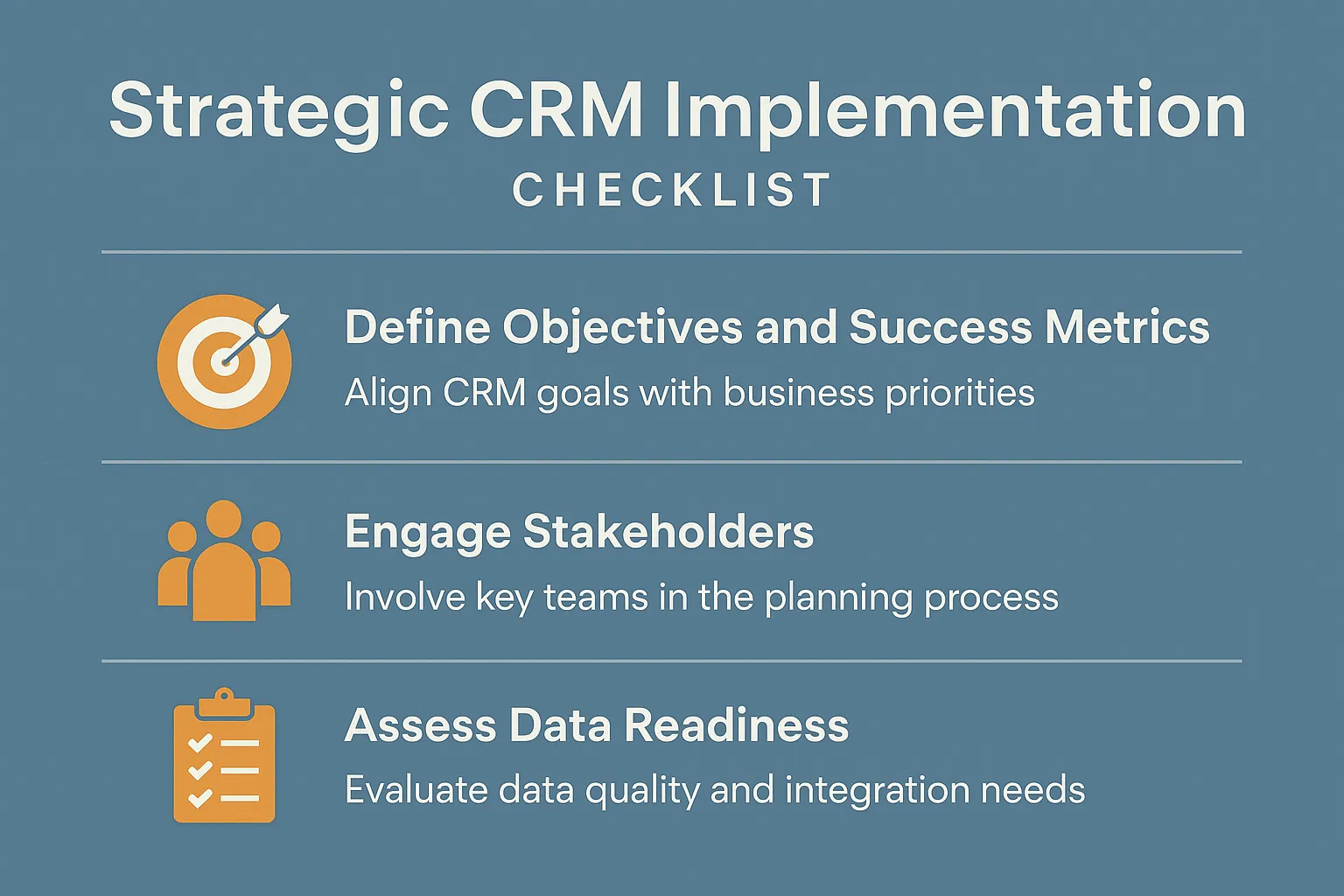What are CRM Implementation Services?
When companies decide to adopt a customer relationship management (CRM) system, implementation services help bridge the gap between buying the platform and seeing real business results. These services involve shaping the system to fit the way a business actually works.
Typically led by consultants or technology partners with deep CRM expertise, implementation services begin with understanding a company’s current operations. That might include talking to sales teams, mapping out customer touchpoints, and identifying what’s broken (or simply inefficient) in the existing process. From there, the CRM is tailored to support those workflows and goals.
Key aspects of CRM implementation often include:
- Discovery and planning: Digging into how the business runs today and what the CRM needs to support tomorrow.
- Customization and setup: Adjusting the CRM’s structure to match internal processes, covering everything from pipeline stages to automation triggers.
- Data work: Migrating old records, cleaning messy datasets, and connecting the CRM to other tools like ERP or marketing platforms.
- Training and rollout: Getting users up to speed so the system gets adopted and making sure there’s help available post-launch.
- Continuous improvements: Once live, the system isn’t static; it evolves as the business does.
Done right, CRM implementation services ensure that the system becomes a meaningful part of daily operations. They reduce trial-and-error risk, increase user adoption, and give teams the tools they need to build stronger, more data-informed customer relationships.
Related Article: CRM Customization - The Key to Future-Proofing Your Business
Strategic Considerations Before Implementation
Jumping into a CRM project without a clear plan is a fast track to disappointment. The technology might be powerful, but without the right foundation, it won’t solve the issues it was brought in to fix. That’s why businesses considering CRM implementation services need to take a step back and assess their strategy before any buildout begins.

1. Start with the Why
Before touching the system, you need to know what you’re hoping to accomplish. Are you trying to improve visibility across teams? Reduce manual data entry? Accelerate your sales pipeline? The more specific the goals, the easier it becomes to design a system that supports them.
Too often, companies adopt a CRM expecting it to “just work.” But a platform without direction is like a GPS without a destination—it doesn’t lead anywhere useful.
Ask yourself:
- What problems are we trying to solve?
- Which teams will benefit—and in what way?
- How will we know if this is working?
CRM implementation services are most effective when there’s a clear business case driving every decision.
2. Take a Hard Look at Your Current State
It’s not enough to know where you’re headed. You also need to understand where you’re starting from. That means reviewing how your processes work today. Not on paper, but in practice. Are there gaps between departments? Are reps finding workarounds that slow things down? Identifying these issues early can save time and money later.
During this stage, you might uncover:
- Bottlenecks in how leads are handed off or followed up
- Inconsistent processes across regions or teams
- Tools that don’t talk to each other—and create data silos
Good CRM implementation services won’t just recreate your current setup in digital form. They’ll help you streamline and improve it.
3. Get Everyone on the Same Page
Even the best-designed system will fall flat if people aren’t aligned. Leadership needs to champion the project, and end users need to feel like they’re part of the process, not just recipients of a new tool.
That means getting input early, communicating the “why” clearly, and ensuring support is available when questions arise. CRM implementation isn’t just a technology shift—it’s a cultural one.
Some key questions to consider:
- Is leadership committed to long-term adoption?
- Have frontline teams had a chance to weigh in?
- What training and support will be in place post-launch?
CRM implementation services aren’t just about rolling out software. They’re about setting up your people (and your processes) for long-term success.
Related Article: Hiring a Digital Transformation Consultant
Key Phases of the CRM Implementation Process
Rolling out a CRM system isn’t something that happens overnight. Rushing through the process usually leads to low adoption, missed requirements, and a lot of frustration down the line. The good news? With the right approach, CRM implementation can become a growth catalyst instead of a growing pain.
Most CRM implementation services follow a structured approach, broken down into clear phases. While the specifics can vary depending on the platform and your business, the core journey tends to look something like this:
1. Discovery and Alignment
Everything starts with asking the right questions. What are your business goals? Who will use the CRM? What’s broken in your current setup? This is where stakeholders—from sales and service to marketing and IT—come together to outline needs, pain points, and priorities.
The goal of this phase is to gather requirements and build alignment. When everyone’s on the same page from day one, the process moves faster and smarter.
CRM implementation services often include workshops, interviews, and process mapping during this stage to build a foundation for success.
2. Design and Planning
Once the vision is clear, it’s time to design a system that supports it. This phase involves defining how the CRM should be structured: custom objects, user roles, workflows, dashboards, integrations—you name it.
Think of this as the blueprint phase. You’re not building yet, but you’re making sure that when you do, it’s the right fit for your business. Rather than a generic, one-size-fits-all solution.
Strong CRM implementation services will focus heavily on usability during this step, ensuring the final system supports daily work, not just executive reporting.
3. Build and Configure
Here’s where ideas become reality. The system is built out based on the plan—custom fields, automation logic, integrations with third-party tools, and any tailored features your business needs.
This is also the time to clean and migrate your data. No one wants a shiny new CRM filled with messy, duplicate, or outdated records. Data migration is complex, but it’s one of the most critical steps in the process.
A good implementation partner will also be testing every component along the way, so you’re not left with surprises at go-live.
4. Testing and Training
Before anything goes live, the system needs to be thoroughly tested. Not just by the developers, but by actual end users. User acceptance testing (UAT) helps surface issues early, while there’s still time to adjust.
Training should also start before launch. This is all about helping users understand how the system supports their day-to-day work and why it matters. Effective CRM implementation services prioritize hands-on, role-specific training that sets users up for long-term success.
Related Article: Sustaining Change - Ensuring Long-Term Results and Continuous Improvement
5. Go-Live and Optimization
With testing complete and users trained, it’s time to flip the switch. But go-live is often just the beginning. You’ll likely need to monitor system performance, respond to user feedback, and make minor tweaks as real-world usage reveals gaps or friction points.
Ongoing optimization is part of what separates a successful CRM from one that falls flat. The best CRM implementation services don’t just disappear after launch—they stay involved to help refine and improve the system over time.
What Can You Expect for the Costs of a CRM Implementation?
When it comes to budgeting for a CRM rollout, the question on everyone’s mind is: How much is this really going to cost? While it’s impossible to nail down a fixed number without knowing your unique situation, understanding the factors that influence cost can help you prepare and avoid surprises.
CRM implementation services don’t come with a one-size-fits-all price tag. Instead, costs tend to fall within a broad range depending on several key variables. Here’s what typically drives the investment up or down:
1. Complexity of Your Business Processes
If your sales, marketing, and service processes are straightforward and well-defined, the implementation tends to be simpler, which means it’ll be less expensive. On the other hand, if your business involves multiple product lines, territories, or complex approval workflows, expect the project to require more time and expertise. That naturally adds to the cost.
2. Level of Customization and Integration
Out-of-the-box CRM platforms cover a lot, but rarely do they meet every unique business need straight away. The more customization you require—whether it’s tailored dashboards, custom data models, or automated workflows—the more resources and time the implementation will demand.
Similarly, integrating the CRM with other business-critical systems, like ERP, marketing automation, or customer support platforms, requires specialized knowledge and effort, which also factors into the budget.
3. Data Migration Needs
Data migration can be deceptively complex. The volume of data, the state of data cleanliness, and the number of legacy systems involved all affect how much work is needed. If your data needs significant cleaning, deduplication, or transformation, that will increase the time and cost of implementation services.
4. User Training and Change Management
Adoption is often the make-or-break point for CRM success. Investing in thorough training programs and ongoing support requires both planning and resources. If your organization is large or spread across multiple locations, this part of the project can become a significant portion of the overall investment.
5. Post-Implementation Support and Optimization
A CRM isn’t a “set it and forget it” tool. Budgeting for ongoing support, tweaks, and enhancements after launch ensures the system continues to evolve with your business. Many CRM implementation service packages include some level of post-launch assistance, which is important to factor in.
Expecting the cost of CRM implementation to fall into a neat, predictable box isn’t realistic. Instead, think of it as an investment influenced by the unique complexity of your business, the scope of customization and integrations, data quality, training needs, and ongoing support.
By working with experienced CRM implementation services providers who tailor their approach to your specific needs, you’re far more likely to get the right system for the right price. An investment that grows with you rather than becoming a costly burden.
How Do You Determine Value or ROI from CRM Implementation?
Investing in CRM implementation services is a significant commitment, so it’s only natural to want a clear picture of the return on that investment. But measuring value isn’t always as simple as looking at sales numbers right after go-live. True ROI comes from how well the system supports your business goals over time—and that means taking a strategic approach to tracking success.

Start with Clear Objectives
Before you can measure value, you need to define what success looks like. Are you aiming to close deals faster? Improve customer retention? Get better insight into sales pipelines? Setting specific, measurable goals upfront gives you a benchmark to compare against after implementation.
Without clear targets, it’s easy to focus on vanity metrics (i.e. how many users log in) without understanding if the CRM is truly driving better outcomes.
Look Beyond the Surface Metrics
Some benefits of CRM implementation services show up in obvious places, like increased revenue or more qualified leads. But others are more subtle: improved collaboration across teams, faster response times to customer inquiries, or more accurate forecasting.
For example, better data quality and automation can reduce administrative work, freeing sales reps to focus on selling. These efficiency gains might not immediately show up in the bottom line but have a real impact on productivity and morale.
Use Data to Your Advantage
A CRM system gives you access to a wealth of data. Tracking the right metrics over time helps identify trends and uncover areas where the system is helping, and where it might need some adjustment.
Key performance indicators (KPIs) to watch might include:
- Sales cycle length
- Lead conversion rates
- Customer retention rates
- Average deal size
- User adoption and engagement levels
By regularly reviewing these numbers, you can make informed decisions about where to invest further or refine your processes.
Remember the Long Game
ROI from CRM implementation isn’t just about quick wins. It’s about building a foundation for scalable growth and better customer relationships over months and years. That’s why ongoing support and optimization are so important.
The best implementations aren’t about delivering and installing software. They should help you build a smarter, more data-driven business that can adapt and thrive.
Related Article: Digital Transformation Solutions - A Complete Guide for Growth
How to Find the Right Implementation Partner
Choosing the right partner to help with your CRM implementation services is a decision that can make or break the entire project. It’s not just about technical skills—though those are crucial—it’s about finding a team that understands your business, communicates well, and can guide you through the bumps along the way.
Look for Industry Experience
Not all CRM projects are created equal. Some industries have unique challenges that require tailored solutions. When evaluating potential partners, ask about their experience in your specific field. Have they worked with companies like yours? Do they understand the nuances of your sales cycles, customer types, or regulatory environment?
A partner who knows your industry will anticipate common pitfalls and recommend best practices that save time and money.
Prioritize Clear Communication
Implementation projects are complex. There will be plenty of moving parts and decisions to make. You want a partner who keeps communication open and transparent. This means regular updates, clear timelines, and the ability to explain technical details in plain language.
If you find a provider who listens carefully and answers your questions honestly from the start, that’s a strong sign they’ll be easy to work with when challenges arise.
Check References and Track Records
Don’t just take a vendor’s word for it. Ask for references and case studies. Reach out to their previous clients if possible. How did the partner handle unexpected issues? Did they deliver on time and within budget? Did the CRM implementation services result in measurable business improvements?
Hearing from real customers helps you gauge whether the partner can deliver what you need.
Evaluate Their Support and Training Approach
A CRM isn’t useful if your team doesn’t adopt it. Make sure your implementation partner offers more than just system setup. Training, change management, and post-launch support are all critical to success.
Find out how they handle user training and ongoing assistance. Do they offer customized programs? Are they available to help troubleshoot after go-live? The right partner will treat your CRM as a long-term asset, not just a project to check off the list.
Picking the right CRM implementation services partner means looking beyond credentials. It’s about fit, communication, and shared commitment to your goals. Take your time in this stage—it pays dividends down the road.
FAQs About CRM Implementation Services
When it comes to CRM implementation services, there’s no shortage of questions from businesses eager to get it right. To help clear the air, here are some of the most common questions we hear, along with straightforward answers to guide your thinking.
1. How long does a typical CRM implementation take?
The timeline varies widely based on the size of your organization, complexity of your processes, and how much customization you need. Small businesses with simple workflows might be up and running in a few weeks, while large enterprises with extensive integrations can expect several months.
Planning ahead and working with experienced CRM implementation services can help keep the project on track.
2. What’s the biggest challenge during CRM implementation?
Change management often tops the list. It’s not just about installing software—it’s about getting your teams to adopt new ways of working. Without buy-in from users and solid training programs, even the best CRM systems can fail to deliver value.
A strong CRM implementation services partner will focus on people as much as technology.
3. Can we customize the CRM to fit our unique needs?
Absolutely. One of the biggest advantages of modern CRM platforms is their flexibility. From custom fields and workflows to specialized reports and integrations, the system can be tailored to support your specific business processes.
Just keep in mind that the more customization you add, the more planning and testing are needed.
4. How do we handle data migration?
Migrating data from existing systems is a critical part of CRM implementation services. It involves cleaning, deduplication, and mapping your current data to the new platform. Rushing this step can lead to messy data and user frustration.
Partnering with experts who follow best practices will help ensure a smooth transition.
5. What kind of ongoing support should we expect after launch?
CRM isn’t a “set it and forget it” tool. After launch, you’ll want support for troubleshooting, additional training, and system optimization as your business evolves. Many CRM implementation services include a post-launch phase focused on adoption and continuous improvement.
Having a partner that stays engaged beyond go-live is key to maximizing your investment.
Need Help with Salesforce Implementation?
Partnering with Gerent means gaining a trusted advisor who tailors CRM implementation services to your unique business challenges, ensuring seamless integration and maximum ROI. Our expert team combines deep technical know-how with strategic insight to drive adoption and unlock growth opportunities. Choose Gerent to transform your CRM investment into a powerful, lasting competitive advantage.










